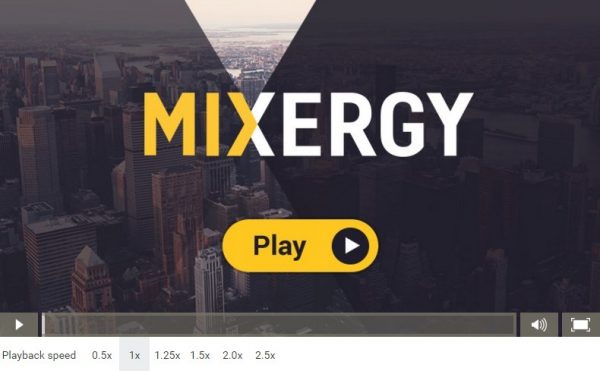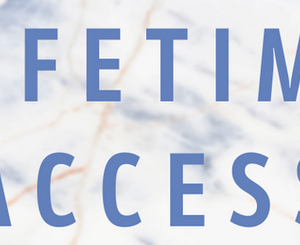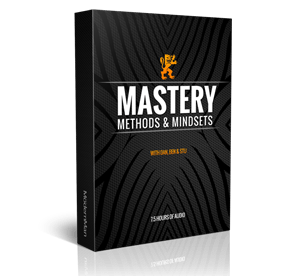Jim Camp – How to Negotiate Like a Pro
$1,455.00 Original price was: $1,455.00.$120.65Current price is: $120.65.
After hearing some great negotiating stories on Mixergy from angel investors, entrepreneurs and business leaders, a few people emailed to ask for more specific negotiating techniques. So I invited Jim Camp…
Jim Camp – How to Negotiate Like a Pro
After hearing some great negotiating stories on Mixergy from angel investors, entrepreneurs and business leaders, a few people emailed to ask for more specific negotiating techniques. So I invited Jim Camp, whose “Start with No” negotiating methods have been trusted by over 500 multinationals and have been taught to over 100,000 students, to teach us.
Andrew: This interview is sponsored by WuFoo, where you can get embeddable forms and surveys on your site for free. And you can even get beautiful reports, like this one, so you can analyze the results you get. It’s also sponsored by Shopify. If you go to Shopify.com, you’ll be able to create and manage your own online store. And they even have an apps store, which lets you enhance your store with powerful plug-ins. And this interview is sponsored by Grasshopper, which has unlimited extensions. And here, let me let them explain them to you.
Announcer: Dedicate an extension to each employee and department, so your business can run more efficiently, and project a professional image to callers. Each extension has its own call forwarding, voice mail, and message notification settings. And even if you’re the only employee, by utilizing multiple extensions, you’re giving your small business the big company sound it needs.
Andrew: All right. Here’s the program.
Hey, everyone. I’m Andrew Warner, founder of Mixergy.com, Home of the Ambitious Upstart. And today we are going to learn how to negotiate. How to negotiate properly. And to learn how to do that, I invited Jim Camp. He is a leading global expert on negotiations. And he’s trained and coached over 100,000 people. He’s worked with more than 500 multi-national organizations, including Intel, IBM, Cisco Systems. His site is full of companies that he’s worked with. I’m going to limit it to these three, and encourage you to go check out his website to find the rest. He’s also been featured on CNN, CNBC, the Wall Street Journal, Harvard Business Review, and many, many, many other shows and publications, including today, Mixergy.com. Jim, I refer to the website. What is the website?
Interviewee: Startwithno.com
Andrew: Startwithno.com. Let me ask you this as the first question. And this is a selfish question, but it needs to be asked. If we learn what you’re about to teach us here today, and what you teach in your courses, and what’s available on your website, what’s in it for us?
Interviewee: Well our last client we tracked, where we actually tracked every negotiation that we coached, we returned $400 to $1 of coaching fees.
Andrew: Because they were able to negotiate so strongly, they ended up with $400 more per dollar than they invested in the program.
Interviewee: That’s right. They had a gain. On 76 million dollars in negotiations, they had a gain of a little over 11 million dollars.
Andrew: OK. You know what? I really respect that. A lot of times when people teach, they don’t have a way, they don’t have a feedback loop, a way of measuring how successful what they’re teaching is out in the field. And I like that you’re measuring it in dollars and cents. So let me get an overview of what we’re going to learn here. And ask you, how about this? You say, ‘start with no”. Why start with “no”?
Interviewee: Well start, the word, one of the biggest challenges in the world today is what the word “no” really means.
Andrew: Hmm-hmm.
Interviewee: I didn’t find an audience, when I talked with an audience, say, and you’ll be shocked at the different thoughts people have about the word “no”. No one brings up that it’s just a decision to be changed. They talk about rejection. They talk about the fear of hearing it. They talk about all these negative connotations with “no”. “No” is the ultimate negative word. But in reality, “no” is nothing more than a decision to be changed. And it’s the safest decision to be made. It maintains the status quo. So, there’s a lot of dynamics around the word ‘no’, so that’s why we’ve encircled ‘no’. My best selling book, ‘Start With No’, gets into that heavily.
Andrew: But Jim, [??] we’ve got a bit of an echo, all right, there we go, it went away. Jim, aren’t we supposed to, if somebody says ‘no’, aren’t we supposed to just let them move on? Aren’t people who don’t stop at ‘no’, who see ‘no’ as a decision that needs to be changed, aren’t they considered obnoxious in the world? We don’t want to be seen as obnoxious, we want to be seen as likeable, smart, successful businesspeople.
Interviewee: Sure, we want to be likeable, we want to be smart, we definitely want to be successful. But if you think for a moment, the entire audience that I reach out to today can say ‘no’ to anything I say today. The important part might be just, just reject what I’m saying, and be comfortable with that. It won’t hurt me in any way. It won’t just happen.
Andrew: Did I just, you were…
Interviewee: Say ‘no’…
Andrew: I see… Sorry, there’s a little big of a lag, I’ll let you speak, and I’m sorry, I shouldn’t keep interrupting because of this lag.
Interviewee: You want me to keep… OK, you see, so how did I appear, how do you appear to the audience when you’re comfortable hearing them? You appear confident, effective, you feel comfortable, you appear comfortable.
Time Start: 5:00
Interviewee: So all those things allow apply to allowing someone to say no comfortably. It’s a very powerful dynamic in negotiations. Very Powerful
Andrew: To allow somebody to say no is a powerful dynamic? How do you mean?
Interviewee: Well when’s the last time someone said to you: Look I’ve got a great idea for you and I’d like to show it to you, and when I’m finished it’s ok to reject it you won’t hurt my feelings. Is that fair, would that be fair?
Andrew: Yeah?
Interviewee: So would the party now have the barriers come down a little, spend a little more time looking more closely at the proposition.
Andrew: I see what you’re saying, yeah.
Interviewee: So that’s just negotiating an agenda is all we are doing. Of what’s going to happen.
Andrew: I see. Ok, so before we get started, before we start negotiating we say look it’s ok for you to say no. And by doing they we let the other person reduce his barriers and listen and take in what we’re saying without feeling like they have to find a way out of it just in case.
Interviewee: That’s exactly what we’re doing. We’re allowing that person to be comfortable saying no and being engaged because we’re not pushing them to change, we’re asking them to maintain status quo and just take a look so it’s a whole different dynamic.
Andrew: Ok. Alright. One of the other things I’ve read about you is that you reject the idea of win-win which everybody else talks about is the goal of negotiating. Why?
Interviewee: Well let’s talk first of all you never win a negotiation. And you never lose a negotiation. What happens is all you do is maintain your mission and purpose your long term aim or you advance it. So there’s no such thing as winning and losing. The other thing that really drives me to attack win-win is that it’s steeped in compromise. Collective bargaining requires compromise. Negotiation does not. Yet you take a look at the win-win philosophies and all the books out there, the hundreds of books we take advantage of those mind-sets because they believe they have to give something up in order to be liked, or in order to have a win. So they falsely use compromise to manipulate the negotiation and they end up giving up far more than they should. So between compromise and making assumptions. What do we do? We prepare a BATNA Now a BATNA is ridiculous. That’s the Best Alternative Negotiated Agreement, whatever, they come up with a BATNA. A fall back position, before we ever get into a negotiation so they are compromising before they ever begin. And then they get in a negotiation and someone says, look lets cut to the chase, what’s your bottom line. Well we’ve already prepared a bottom-line. We already have a BATNA. And what’s the savvy negotiatior say? Once they’ve given up that bottom line? Gee, that’s not quite good enough. So now the negotiation really gets serious. Because the bottom line number is already there and now they’re asking for more. And then the assumptions and fear step in. Oh my goodness I’m going to lose this deal. Oh My Gosh. And they start guessing again and assuming oh well I’ll give up 3 more percent and I’ll get this deal. You see it everyday. I see it every day in coaching.
Andrew: Actually would you mind then giving us an example from one of the people you’ve coached? I’d like to see what this looks like in action. How somebody starts to compromise before the negotiating starts, how they make assumptions and how they back off before they’ve even begun.
Interviewee: Sure, I’ll give you a great story. This is a true story: One of my chairmen called me to California, to Silicon Valley, for a meeting. And it was with Pacific Rim Senior Vice President and his team and they were trying to move the technology into Korea and the Senior Vice President and his entire team–now you’re going to love this–believed that, they truly believed, that to Korea, the first round of technology had to be given to the Korean corporation, you would know the name of, and it was eighty million dollars in hardware to be given to Korea just to get into the marketplace and the senior vice president actually said: I truly believe they’ll like us if we do that. And there’s an example, that’s an extreme BATNA. I mean we hadn’t even engaged that company yet and here was the senior vice president arguing, convincingly…
Time End: 10:00
Begun 00:10:00 (minute 10)
Here is the senior Vice President arguing convincing to the board of directors and to the Chairman to the leadership that the fall back position was to give them 80 million dollars in equipment, in order to penetrate the market place and when the Chairman asked ëHow do you know this?’. Well, we have been in Korea we have been in this area a long time and we know from the past experience this is the best way to do business, they will like us. That is an extreme but it’s bizarre what people will give away, not even have a meaning.
Andrew: Okay now you have theseÖ let me adjust the microphone here We keep getting here we go. If we have these assumptions how do we avoid them by getting real information by getting solid data before we go into negotiations. So that we are negotiating intelligently and not making things up.
Interviewee: Well there are a couple of things we have to do one we have to do research, which very often we don’t do. And then this is going to sound little we have got to do research but then we have to also reject the research. Now you are going to say wait a minute, How do you reject research? Here is what we do we take the research that we have dug into and then we reject it and then we do our own research at the point in the sphere negotiation. So by asking the proper questions, outlining the proper questions, we can do our own research during the negotiation to find out what is really true and what is really not true. Because see a lot of times let us take for example websites, websites are usually a sales tour and I don’t mind in my website we try to get the vision of coaching to get people interested in what we are doing? And so I would encourage and I do encourage people to read my book first, then I encourage people to call me on the phone like we are doing today with you. I encourage people to dig into what we are doing now, so that is how we eliminate assumptions by realizing that is what they are.
The greatest strength for professional negotiator is to not know. So you have to ask because if we don’t know. When someone asks a question we need to train ourselves. I don’t know if I don’t know, I don’t know, so I have got to ask. That is really how we eliminate assumptions that is it, a rapid overview.
Andrew: I am going to take this a little deeper but let us make sure I have an understanding and the way I get a good understanding is to use an example. So let us suppose that I see that you are teaching classes and I say the mix of audience could learn negotiating skills beyond what we are doing here. I would like to get paid for offering gym’s negotiating classes. Why don’t I call them up and work out an agreement where for every class that I sell to my audience I get a cut of what they page in. You are saying the first thing I need to do is go and do my research which might mean calling up other people whose sites you are listed on. May be a taking a look around your website and reveal some kind of a affiliate fee and so on. May be do a little bit of research to see who is upset with you for dropping them on a past or for underpaying them or excited about you for over paying them and then you’re saying reject that research.
By that you mean come into negotiations we are thinking of selling or reselling your classes on big city dot com. How do you structure your deals, what do you pay out referrals? What do you a website how would you get us up and running is that what we are talking about here?
Interviewee: Let me first start off with why would you want a affiliate with me?
Andrew: You are saying I would ask you that. Or you’re asking me?
Interviewee: I would want to try to gather your vision and you should be trying to gather mine.
Andrew: So before we try to get into the tactics you are saying understand Jim’s vision and Jim’s is going to want to understand Andrew Warner’s vision. And that’s why is the decision’s are made in your vision on the emotional side of the brain. So if I can get an idea of your vision and why you might want to affiliate with me. I then can begin to get a picture and make decisions for myself and then I might ask you Andrew why would you think I should affiliate with you? So now I can begin to do my research on your world and your accomplishments and all the thing that you just talked about.
Andrew: What about this if you were to ask about what is your vision why would you want a partner up with me I might
End at 00:15:00 (minute 15)
Andrew: …partner up with me. I might, if I hadn’t already been open in past Mixergy interviews. I might say, “Well, all I want to do is help people. I don’t care about money. I just want to help.” Or I might, actually maybe I’d do that. Maybe I’d say all I want to do is help people. And I’ve misled you because I’ve told you about the view of myself, and of my work, that I want the world to know. And then when you’re negotiating with me, you’re only dealing with this view of me, with this facade that I’m putting up. How do you get past that? How do you get to the real goal?
Interviewee: We have a rule called Three Plus.
Andrew: Hmm-hmm.
Interviewee: And I might say, and we also have a behavior called Strip Line. And I might say to you, Andrew, I might say, “Andrew, I’m really troubled here. I know a lot of really great people like yourself want to help the world, but why would you want to affiliate with me?” Now that’s the second time I ask that question.
Andrew: OK. Why is the second time significant? You’re saying…
Interviewee: Because we have to peel the emotional onion, and create a more complete vision. Has someone ever asked you a question, just off the cuff, very quickly, and you weren’t able to connect? You weren’t able to get a picture of how to answer. And that’s how the brain works. So we have to ask more than three times. The more important the question, the rule is, the more important that we. That’s what we call Three Plus. Now, and we talk about that in the book. Both my books, and all of our training, practices that. But then I would come back and say, “But seriously, Andrew.” I might even change up on you a little bit. I might come back with another question. “Here’s the problem, Andrew. I don’t know really, truly why you would want to affiliate with me. How important is it that your client, your affiliates, all the people you get to touch, how important is it that they find something that really changes their life to the better? How important is that?”
Andrew: I would say, “Very important. That’s the reason why I’m here.”
Interviewee: OK, so you’re really serious.
Andrew: Hmm-hmm. Yes.
Interviewee: Are you really serious about this?
Andrew: Very serious.
Interviewee: That’s a pertinent question, that brings about three possible answers. Yes, no and maybe. If I hear maybe, I’ll continue. If you say, “Yes”, I’ll say, “Are you sure?” If you say, “No”, “Geez, Andrew, I’m falling short here. Where am I falling short?” So our system enables you to go any direction you have to go, all the while knowing that we have to create vision in the other party. Because that’s where their decisions will be made. Their decisions to give up valuable information are made right there. And so I actually had a client one time, and here’s an example. I had a great client one time, CFO of a company at the time. He’s in Korea. And we couldn’t figure out why this adversary so much wanted this contract. It was really uncomfortable, very, very uncomfortable. And Bob, his name was Bob, when I said, “Bob, we may have to Twenty Plus this question. Why this contract? Why do you want, why would you want this contract?” And we asked it of the Korean CEO. And Bob said he asked it nine times. And in the ninth answer, the Korean CEO said, “The contract, I’m just going to break it anyway. So you’ll have to sue me.” He actually gave that up to Bob. So of course, we wouldn’t, they wouldn’t, sign the contract, because his intention was to break it anyway.
Andrew: I see. I see. You know, I’ve had reporters do that to me. They’ll ask me a question. I won’t answer. They’ll ask me a question. I won’t answer. They’ll ask me the same question again, and maybe I’ll come up with a phrasing of the answer that feels comfortable to me, but doesn’t reveal what I don’t want to reveal. But by the fifth time that they ask it, somehow something slips. It’s amazing that it does. And you know, the other thing that I noticed, earlier you said, sometimes when people answer the first time, they’re not giving the right answer. They’re just giving an answer. I’ve noticed that in interviews. I’ll interview somebody, after having done a pre-interview with them, I know I’m thinking of one person specifically, we talked in the pre-interview. We agreed to certain things that were facts. He comes on here. I’ve got them, facts on his website. He comes. I ask him a question, and he gets the facts wrong, about his own company!
Interviewee: [Laughs]
Andrew: I have to come and re-phrase it. It’s because it’s not a natural situation to be sitting here facing the light, facing the camera…
Andrew:because It’s not a natural situation to be sitting here facing the light, facing the camera, having the live audience her to interact, knowing that people going to watch afterward, and i can imagine too a negotiating situation isn’t a normal situation for most people
Interviewee:no your exactly right, here’s the trick, and i call it the secret sauce, there are rules and fundamentals to negotiation that cannot be broken, and so often they are broken or people don’t know what they don’t know and those rules for example we were talking about 3 plus and that’s a very powerful psychological rule because you have to give the brain a chance to catch up and create division I do a journal in workshops and i don’t do many workshops anymore when we did do workshops and i would do an example where i would have everyone close their eyes and bow their heads down and i would ask three questions and as soon as you had a vision put your hand up and invariably i would take people within 3 questions to the golden gate bridge. I would ask what guards the gate, that would be the first question what is international orange on the west coach, that would be the second question and the third question is windy all the time and invariably someone would have a picture of the golden gate very quickly some would have it immediately with the first question but the point is that you have to give the brain time to process the question and if the reporter and I’ve done a lot of interviews like yourself the reporter is going to push very very hard with one single question you have to have a tool another principle of ours called reverse and you might not be able to see it but i used a reverse with you when you first asked me about why would you want to be an affiliate with me, and i said to you thats a great question i was wondering kinda the same question why you would want to be an affiliate with me and that’s a reverse so you have that tool in your tool kit but its a rule it’s a principle its not a tactic it’s nt a trick it’s designed to create vision and you have to use it properly in order to be able to move the negotiation forward
Andrew: ok ok you talked about getting the other sides vision, what about our side. I know that, well should we walk into negotiation with a vision of where we want to go out or should we just be open to having a dialog and try to figure it out there.
Read more: http://archive.is/h3cGA
Here’s What You’ll Get in Jim Camp – How to Negotiate Like a Pro
Jim Camp – How to Negotiate Like a Pro : Sample
Be the first to review “Jim Camp – How to Negotiate Like a Pro” Cancel reply
Related products
Personal Development
Personal Development
Thais Gibson – Personal Development School – Post-Traumatic Growth A Hero’s Journey
Personal Development
Personal Development
Tara Stiles – Your Daily Yoga Practice with Tara – 30 Minutes – 2018
Personal Development
Mattias Krantz – Learn “Willow Warbler” a Fingerstyle Guitar Composition
Personal Development
Personal Development
Personal Development














Reviews
There are no reviews yet.